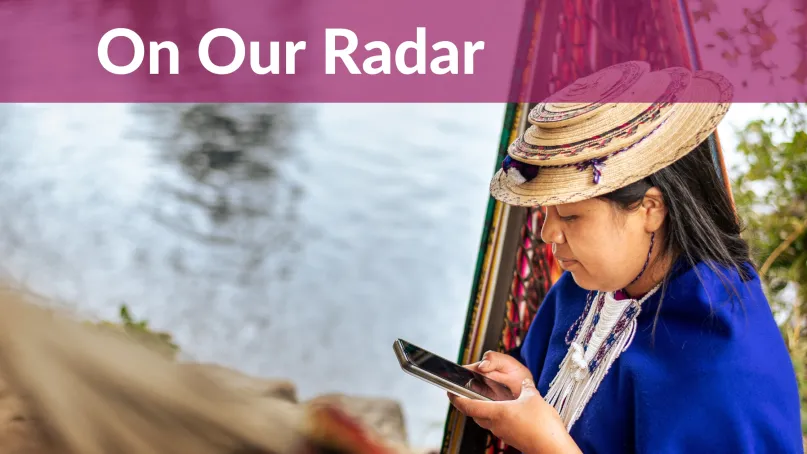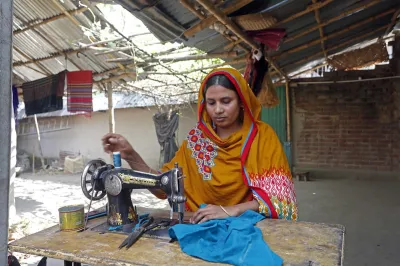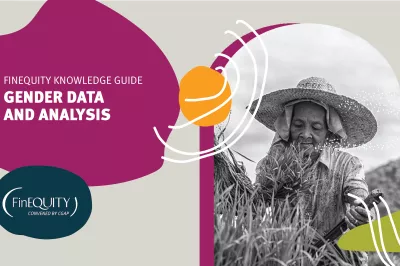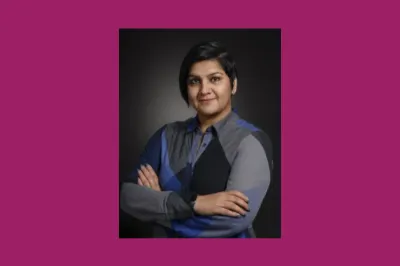On Our Radar: April 2024

An updated take on "What We're Reading". The FinEquity team brings you a curated list of women's financial inclusion and economic empowerment content we've been consuming recently, from podcasts, new initiatives, and articles to videos and social posts.
On Our Radar
Rural Women and Financial Inclusion
Improving the gender-responsiveness of design and delivery of rural finance interventions through innovative approaches and mechanisms is important for promoting rural women’s economic empowerment. This Technical Guidance Note developed by FAO, is designed to be a practical resource for practitioners who are engaging at country level to help advance rural women's financial inclusion. It offers a step-by-step approach to analyzing the state of gender equality within a specific country or context, with the purpose of diagnosing potential entry points for interventions that aim to increase rural women’s financial inclusion.
Gender-Intentional Credit Scoring
This guide introduces a gender-lens analytical framework for lenders to determine whether lending decisions and outcomes in their portfolios differ by gender and, if so, how. For lenders using credit scoring models, the guide presents different gender-intentional techniques for adjusting their credit scoring models to more accurately reflect risk. It also offers implementation strategies—such as setting other decision threshold policies for women and men.
Measuring Women’s Economic Empowerment in Financial Sector Deepening and Financial Inclusion Programs
The measurement of Women’s Economic Empowerment (WEE) is widely acknowledged to be complex and challenging. This Guidance Note presents a framework and methodology for measuring the WEE outcomes of FSD projects and interventions. It is particularly useful for development practitioners and policymakers in the financial sector, providing methodologies for credible and effective monitoring and evaluation of WEE outcomes, thereby enhancing the impact and efficiency of financial inclusion initiatives.
Women Entrepreneurs Can Make the World $6 Trillion Richer
The financial industry needs to redesign its lending practices to give more consideration to small borrowers, especially women. In this Blomberg opinion piece, Melinda French Gates shares a number of reforms that leaders can pursue to address the financing gap for women entrepreneurs.
GenderLinks
GenderLinks is an online hub where USAID staff and the broader international development and humanitarian assistance community can find tools and resources on integrating gender into their work across all sectors. It is also a place where international development and humanitarian practitioners can learn about the importance of gender equality and the empowerment of women and girls.
Her Fintech Edge: Market Insights for Inclusive Growth
Until now, there has been limited research that quantifies the degree to which fintech firms are actively addressing women's financial inclusion and the specific strategies that are showing success. To fill this gap, IFC conducted a survey of 114 fintech firms in emerging markets around the globe. This study provides insights from fintech firms about their own perceptions and practices to deliver services to women’s customer segments. The report highlights opportunities for fintech firms to intentionally design for women customers in emerging markets. It reveals that by using business strategies informed by analyzing sex-disaggregated data, fintech firms could capitalize on the women’s market while contributing to greater financial inclusion for women.
Four Barriers Blocking Women From Going Digital: Lessons From a Pilot in Rwanda and Uganda
This USAID Learning Labs blog shares four major barriers blocking women's digital empowerment, based on a pilot with Village Savings and Loan Associations (VSLAs) in Rwanda and Uganda. The blog discusses targeted strategies that could help overcome these barriers, offering insights that are pivotal for policymakers, NGOs, stakeholders, and anyone committed to gender equity in digital access.


